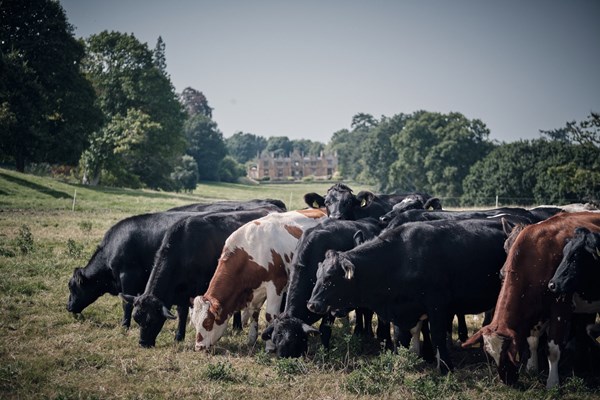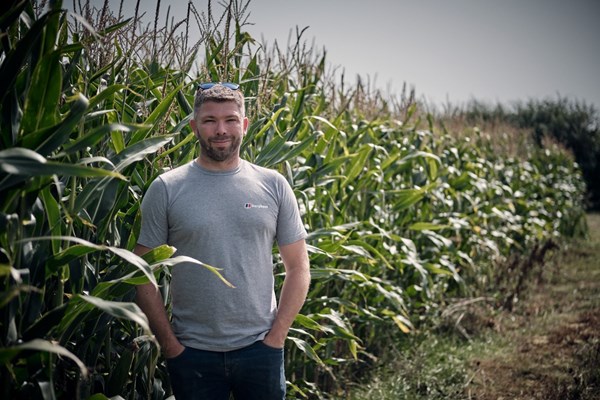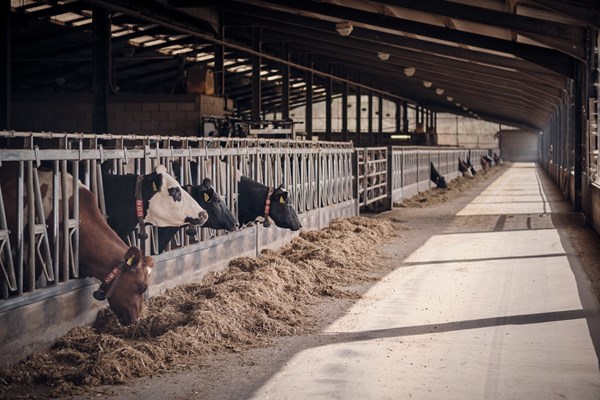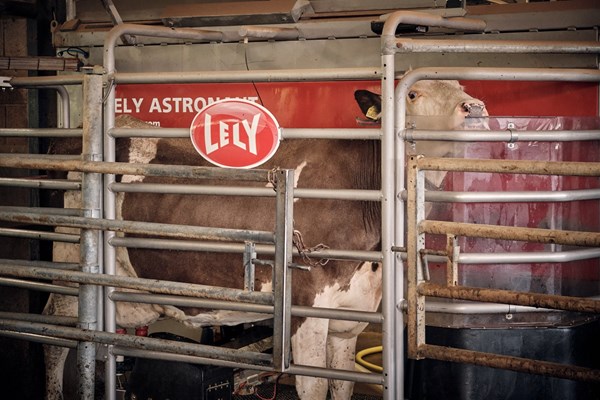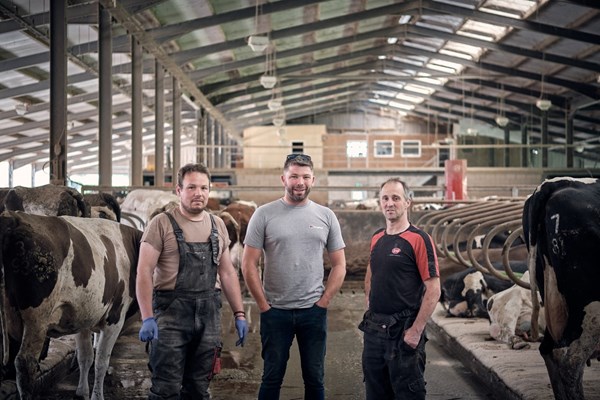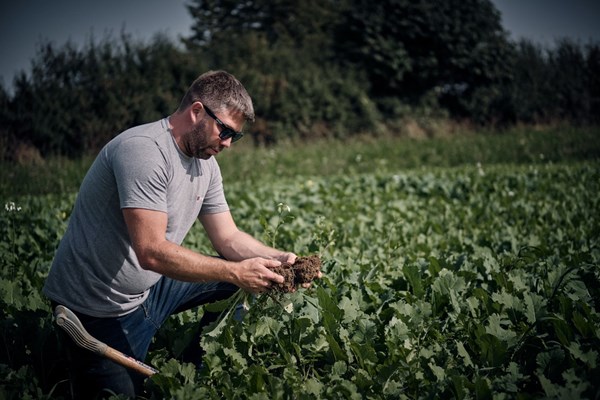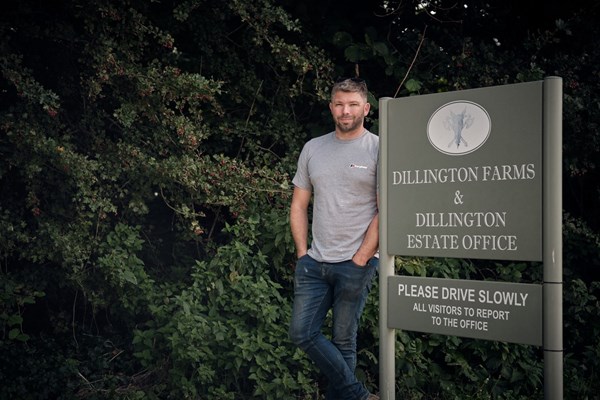- Home
- Projects
- Farm Excellence
- Dillington Farm
Dillington Farm
About Dillington Farm
- Joined the Strategic Dairy Farm network in Autumn 2023
- All-year-round calving
- Fully housed robotic milking herd
- Yields of 10,800 litres per cow with 4,000 litres from forage
- 860 ha used for grazing youngstock and growing forage for cows
Follow Dillington if you are interested in:
- Evaluating the effectiveness of cross breeding
- Starting or continuing your journey to net zero
- Reducing your reliance on fertilisers and pesticides
- Maximising cow and heifer performance
Overview
Knott Oak Dairy, a part of the Dillington Estate in Somerset, is home to 310 cross-bred cows. Ollie, the Farm Manager, has worked with his team of eight to implement changes to help the farm be more environmentally focused through forage crops and home-grown feeds.
Our farm
Dillington Farms is a mixed farming business with dairying at its heart. At 860 ha, the farm grows cereals and forage crops with dry stock grazing permanent pastures and parkland.
Being a part of a mid-tier stewardship scheme has allowed Dillington Farms to be more environmentally focused with their day-to-day farming, including growing herbal leys on arable headlands and experimenting with legume whole crops.
Our herd
This all-year-round calving, fully-housed herd of 310 cows average 10,800 litres per cow per year at 4.20% butterfat and 3.56% protein. The cows at the Dillington estate are milked using robots, helping them to gradually increase their milk yields, through allowing a more relaxed and quieter environment for the cows.
Crossbreeding has played a huge part in allowing Dillington to achieve high milk yields by combining a three-way cross of Holstein, Norwegian Red, and Fleckvieh.
Our journey
Dillington Farms started as a smaller organic dairy farm, with more land being used for arable uses, such as growing potatoes.
However, they moved away from organic dairying because the potatoes grown on the estate required a large landmass for rotation, which didn’t work with the amount of grassland needed for organic dairy farming.
The wider Dillington Estate is used for growing a variety of cereals and forage crops the cows.
The dairy at Dillington Farms was built 6 years ago to help future-proof the farm. One of the biggest changes they made was introducing robotic systems to milk the cows.
This change has helped the farm improve their cow welfare and create a good working environment for the staff.
Through the Strategic Dairy Farm programme, Ollie and his team are looking to continue their journey to being net zero, fine-tune their crossbreeding and improve the profitability of the farm, whilst achieving their environmental goals.
.jpg)
“The programme is a great opportunity to work with different people from around the industry.
"The estate and our farming policies have changed massively over the last few years, and we are now very environmentally focused and trying to do things in a more sustainable way.
"While we feel that we may be doing things slightly differently to others, it is always good to be challenged in a positive way, and we can’t wait to share our experiences and learn from others.”
Steering group
Dillington Farms’ steering group is made up of a variety of farmers and industry experts. The members are:
- Ed Powell-Jackson (Synergy vets)
- Di Allen (independent nutritionist)
- Dave Hinchkins (ForFarmers nutritionist)
- Helen Dent (Kite, environmental consultant)
- David Cotton (dairy farmer)
- Rodney Down (dairy farmer)
- Keith Gue (dairy farmer)
- Neil Christiansen (mixed farmer)
- Neil Baker (dairy farmer)
- Richard Carter (dairy farmer)
News and past events
- Enhancing milk from forage with homegrown feed (May 2024) Two strategic dairy farmers, David from Newlands Farm and Ollie from Dillington Farm, discuss the improvements they made on-farm to increase the milk yield achieved from forage
-
Strategic Farms provide a platform for learning at launch events (November 2023) Reflecting back on the first three launches of the new Strategic Dairy Farm cohort.
-
Launching three new Strategic Dairy Farms (October 2023) Following a successful Strategic Dairy Farm recruitment campaign, we announced the first three farms to launch, including Moorhouse Hall Farm.
Press coverage
- British Dairying: Developing a resilient dairy enterprise (December 2024) In the quest to develop a more self-sufficient farming enterprise on the Somerset-based Dillington Estate, Farm Manager Ollie Blackburn and his team have embraced a range of new ideas, technologies and improved farming practices
- British Dairying: Enhancing milk from forage with homegrown feed (March 2024) The topic of feed efficiency and boosting milk production through forage incorporates a diverse range of solutions, each impacting herds differently, including the herd at Dillington Farms
- South West Farmer: AHDB's Strategic Dairy Farms in the southwest revealed (March 2024) Some farms in the southwest are involved in a program run by AHDB, helping dairy farmers stay informed about the latest research and best practices within the industry
- Western Morning News: New additions to AHDB Strategic Farm network (October 2023) AHDB has announced the first three farms set to launch, including Moorhouse Hall Farm, following a successful Strategic Dairy Farm recruitment drive
- Farmers Guide: AHDB confirms three new additions to Strategic Dairy Farm programme (October 2023) With the completion of a successful Strategic Dairy Farm recruitment campaign, AHDB introduced the first three farms, featuring Moorhouse Hall Farm as one of them
- Cow Management: Three dairy units join AHDB programme (October 2023) AHDB unveiled Moorhouse Hall Farm as one of the first three farms to launch after a successful Strategic Dairy Farm recruitment campaign


